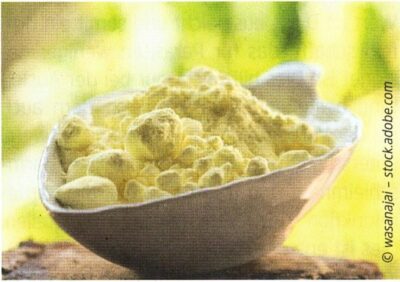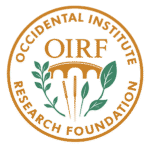Parasites and Symbionts
Parasites and Their Effects on Health
How Holistic Approaches and Sulfur
Heal the Gut and Fight Chronic Inflammation
Parasites are organisms that live in and feed on a host, often at the expense of the host’s health. They are spread worldwide and affect people of all ages and lifestyles. Although they are often associated with tropical regions, parasites are not uncommon even in temperate climates. By traveling, eating contaminated food or water, and contact with animals, people can easily come into contact with parasites.
The symptoms of a parasite infestation are diverse and can range from gastrointestinal complaints, chronic fatigue, skin problems to more serious systemic diseases. In the holistic medical view, parasites are not only regarded as isolated pathogens, but as part of a complex system of environmental factors, nutrition and individual health status.
Frequency and Importance of Parasites
The frequency of parasite infections is often underestimated. It is estimated that up to 80% of the world’s population could be infected with some form of parasite, be it protozoa, worms or ectoparasites. In Germany, there are various parasites that can infect humans. Here are some of the most common parasites:
- Pinworms (Enterobius vermicularis)
Pinworms are the most common intestinal parasites in Germany, especially in children. They cause itching in the anal area, especially at night. - Roundworms (Ascaris lumbricoides)
Roundworms are also widespread, especially in rural areas. Infections often occur after consumption of contaminated food or water. - Tapeworms (Taenia spp.)
Various types of tapeworms, such as the bovine tapeworm (Taenia saginata) and the pork tapeworm (Taenia solium), are found in Germany. Infections often occur after consumption of undercooked meat. - Giardia lamblia
Giardia is a single-celled parasite that causes giardiasis, a disease of the small intestine. Infections usually occur through contaminated water or food. - Toxoplasma gondii
Toxoplasma gondii causes toxoplasmosis, which is often transmitted through contact with cat feces or consumption of raw or undercooked meat. While most people do not show symptoms, the infection can have serious consequences in pregnant women and immunocompromised individuals. - Whipworm (Trichuris trichiura)
The whipworm is less common, but can cause intestinal discomfort and other symptoms in infected people. - Fox tapeworm (Echinococcus multilocularis)
The fox tapeworm is widespread in some rural areas of Germany. It causes a dangerous infection that can lead to cyst formation in various organs, especially in the liver.
These parasites can cause a variety of symptoms that are often not directly recognized as parasitic. These include indigestion, nutrient deficiencies, fatigue, rashes, and even neuropsychiatric symptoms. Holistic medicine recognizes the role of parasites as possible co-factors in many chronic diseases and emphasizes the need for comprehensive diagnostics and treatment.
Naturopathic Approaches to Parasite Cleansing
In naturopathy, there are a variety of approaches to treating parasitic infections that aim to cleanse the body and strengthen the immune system. These approaches include the use of herbs, dietary changes, and detoxifying measures. The importance of a healthy intestinal milieu which is unattractive to parasites, is particularly emphasized.
- Natural Antiparasitics
Plants such as wormwood, cloves, black walnut and garlic have been known for centuries for their antiparasitic properties. They act through various mechanisms, including damaging the cell membranes of parasites and inhibiting their reproduction. These herbs are often taken in the form of tinctures, teas, or capsules and can be used as part of a comprehensive parasite cleanse. - Intestinal Cleansing and Milieu Change
A healthy intestine is the foundation for successful parasite cleansing. Methods such as fasting, taking fiber, and using natural laxatives such as psyllium husks and bentonite clay help rid the intestines of parasites and their eggs. The change in the milieu in the intestine, which is achieved by a diet low in sugar and high in fiber, makes the intestine less life-friendly for parasites. - Nutrition
A nutrient-dense, low-sugar diet is crucial for prevention and treatment of parasitic infections. Sugar and processed carbohydrates promote the growth of parasites, while a diet rich in fresh fruits, vegetables, healthy fats and proteins strengthens the immune system and makes the body more resistant to parasites.
Parasites and Silent Inflammation
Silent inflammation is a chronic, low-grade inflammatory response in the body that often remains unnoticed, but can lead to serious long-term health problems. Unlike acute inflammation, which can be detected and treated quickly, silent inflammation is insidious and can cause damage for years without causing clear symptoms. This type of inflammation is associated with many chronic diseases, including cardiovascular disease, diabetes, autoimmune diseases, and neurodegenerative diseases.
Parasites can play an essential role in the development of silent inflammation. These organisms release a variety of toxins and waste products that constantly activate the immune system. This constant “low-grade” stress leads to a persistent inflammatory reaction in the body called silent inflammation.
Parasites can affect the immune system in several ways:
- Chronic immune activation: Parasites continuously stimulate the immune system, which can lead to a permanent inflammatory reaction. This chronic activation depletes the immune system and can cause the body to overreact, favoring autoimmune diseases and chronic inflammation.
- Release of toxins: The waste products and toxins secreted by parasites can damage tissues and cells, thus promoting inflammatory processes in the body. These toxins can also interfere with the barrier functions of organs such as the intestines, which further aggravates the situation.
Parasites and Leaky Gut
Leaky Gut refers to a condition in which the intestinal mucosa, which normally serves as a protective barrier, is weakened and becomes permeable. This allows unwanted substances such as toxins, indigestible food residues and microorganisms to enter the bloodstream. Not only does this lead to local inflammation in the gut, but it can also trigger systemic inflammatory reactions that contribute to silent inflammation.
Parasites contribute significantly to the development of Leaky Gut:
- Damage to the intestinal barrier: Parasites can directly damage the cells of the intestinal mucosa, which affects the integrity of the intestinal barrier. Some parasites produce enzymes that weaken the Tight Junctions (the connection points between the cells of the intestinal mucosa), which contributes to the permeability of the intestine.
- Promoting a dysbiotic intestinal flora: Parasites can disrupt the balance of the gut microbiota, which can lead to a dysbiosis. This dysbiosis further weakens the intestinal mucosa and contributes to the development of a Leaky Gut.
- Pro-inflammatory substances: The substances released by parasites can have a direct pro-inflammatory effect and damage the intestinal barrier through chronic inflammation.
 Fig. 1: Sulphur against parasites
Fig. 1: Sulphur against parasites
The Role of Sulfur in the Treatment of Parasitosis, Silent Inflammation and Leaky Gut
Sulfur plays a central role in the treatment of silent inflammation and leaky sulfur, especially in the form of methylsulfonylmethane (MSM) or inorganic sulfur, and also plays a central role in the naturopathic treatment of parasites. Sulfur has multiple health benefits that make it an important part of any parasite cleanse.
- Detoxification and Binding of Toxins
Sulfur is an essential component of many detoxification processes in the body. It helps bind and excrete heavy metals and other toxins that are often released by parasites. By improving the detoxification function of the liver and intestines, sulfur contributes to the release of parasitic burdens from the body. Sulfur-containing compounds such as MSM (methylsulfonylmethane) promote detoxification of the body by binding harmful toxins and aiding in their elimination. This is especially important in order to neutralize and eliminate the toxins caused by parasites. - Support of the Immune System
Sulfur compounds support the immune system by increasing cell permeability and improving the absorption of nutrients. A strong immune system is crucial to ward off parasites and fight existing infections. Through its anti-inflammatory properties, sulfur can contribute to reducing the chronic immune activation caused by parasites, thus alleviating the symptoms of silent inflammation. - Milieu Change in the Intestine
Inorganic sulphur can positively influence the intestinal milieu by balancing the pH value in the intestine and thus creating an environment that is less suitable for parasites. This not only helps to eliminate existing parasites, but also to prevent new infestations. Sulphur supports the regeneration of the intestinal mucosa and helps to restore the barrier function of the intestine. This is crucial to cure Leaky Gut and prevent the development of silent inflammation.
Sulphur Cleanse
Dosage
- MSM: Dosage can vary, but often starts with 1-2 grams per day, divided into two doses (morning and evening). If well tolerated, the dose can be increased gradually, often up to 4-6 grams per day.
- Inorganic sulfur: The dosage is usually lower. Here, 500 milligrams to 1 gram per day can be taken, depending on the therapist’s recommendation.
Time of Intake
- Before or during meals: Sulfur should preferably be taken before meals, as this can improve absorption. However, it is important to take it with enough water to avoid possible stomach irritation.
- On an empty stomach: Some therapists recommend taking MSM on an empty stomach in the morning to maximize the detoxifying effect.
Combination with Other Agents
- Antiparasitics: Sulfur is often taken along with other antiparasitic herbs such as wormwood, cloves, and black walnut to enhance the effects.
- Detoxification and intestinal cleansing: It can be helpful to also support intestinal cleansing and detoxification measures while taking sulphur, such as taking bentonite or psyllium husks.
Hydration
- Drink enough water: Sulfur can promote detoxification, which puts a strain on the kidneys. Therefore, it is important to drink plenty of water during the cleanse to support the elimination of toxins.
Result
Parasites play a crucial role in the development of silent inflammation, Leaky Gut, and many other chronic health problems. The holistic medical view emphasizes the need for comprehensive treatment, which includes not only the elimination of the parasites themselves, but also the strengthening of the immune system, detoxification of the body and the creation of a healthy intestinal environment. Sulphur plays a central role in this context by supporting detoxification, strengthening the immune system and improving the intestinal milieu. By integrating these approaches, effective and sustainable parasite cleansing can be achieved, leading to improved health and well-being.
Dr. med. Ingfried Hobert
Keywords: Intestine/gut, parasites, sulfur, silent inflammation

An Exclusive Translated Article for P2P Supporters
From the Monthly Publications of P2P
Published January 2025
From an article in Der Heilpraktiker, Volume 91, October 2024
Machine Translation by Lernout & Hauspie, & Promt
Translation & redaction by: Carolyn L. Winsor, P2P Consulting
© Copyright 2024, Dr. Ingfried Hobert, Germany



